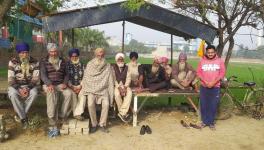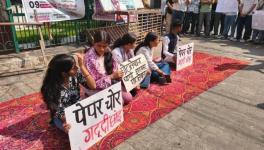With Low Conviction under UAPA, Punjab Youths Languish in Jail without Legal Recourse
As Punjab grapples with a rampant drug crisis and soaring unemployment, hundreds of youths are languishing in jails under the stringent anti-terror law Unlawful Activities Protection Act (UAPA).
While the state’s police machinery claims that the arrests are made to prevent Khalistan-related terrorist activities, conviction rates under the act remain strikingly low with charges not holding ground in many cases. The state has witnessed only one conviction under UAPA in the past 11 years. According to data available with lawyers, between 2009 and 2016, as many as 47 cases were registered under the UAPA. In the next four years after 2016, the UAPA cases more than doubled while the conviction rate went downwards.
As bail under the act remains impossible and conviction under UAPA cases is low in Punjab, the accused remain behind bars for a long time followed by harassment, intimidation, torture and wrongful arrest in connection with the Khalistan movement — a long-pending demand for a separate Sikh homeland.
“Delhi Police Called Him to Put CCTV, Never Returned”
In his early 20s, Lovepreet Singh Lovely of Samana area in Punjab has been languishing in the custody of a special cell of the Delhi police under charges of unlawful activities and possession of illegal ammunition. Lovepreet was arrested on June 18 and has been in jail since, with no charge-sheet filed in the case yet. Meanwhile, the structural inadequacies of the legal mechanism turning the hopes of the family to see their son bleak.
Speaking to NewsClick, Satnam Singh, Lovepreet’s brother said, “My brother has been taken in custody after being charged under the UAPA. At the police station in Samana, I was asked who sent me there. My brother ran a small business of CCTV cameras. He informed me over a phone call from jail that the Delhi Police told him that they needed security cameras to be put in place, which is why they contacted him, post which he was arrested. He was arrested on his way from the shop.” Singh said that his brother pleaded that he was innocent and had no business with Khalistan, and still the police arrested him. “Our household was being taken care of with the work he did. Now we are struggling to make ends meet. I have two sisters and my parents to take care of,” he added.
Activists and lawyers in the state have over time alleged that the stringent act is being used excessively by the Congress government in the state to create an atmosphere of intimidation even as families struggle to avail legal recourses.
Lack of Special Courts, Delayed Trial
Speaking to NewsClick, Delhi-based lawyer Tamanna Pankaj said, “Lovepreet’s case is not a lone case, it is difficult to ascertain the exact number but several are currently languishing in multiple jails while legal recourses remain inadequate. The police have not been seeking extensions and not filing charge sheets at the same time. The lack of special courts and special judges needed to address cases under the UAPA not being available are delaying the trial.”
Ludhiana-based lawyer Jaspal Singh Manjhpur claimed the police have arrested 370 persons in 94 cases under the UAPA since 2007. Manjhpur was himself booked under the anti-terror law in 2009 and spent nearly a year and half in jail accused of conspiring against the state. He said in half of the 94 UAPA cases, the accused were either discharged or acquitted and the remaining cases were still pending in the courts.
The Indian Express, in a study of 10 high-profile cases registered under the UAPA in Punjab in recent years, found that no crime had taken place in eight of the 10 cases. “The police had arrested the accused on the basis of information that they may commit a crime,” the newspaper report said.
Over the years the UAPA has taken a toll on those wrongfully arrested. In July this year, a Dalit man committed suicide post questioning and alleged torture by the NIA over his involvement in the movement. Punjab-based lawyers say that his case is only one of the hundreds of cases coming in the backdrop of Referendum 2020, an international online campaign aimed at drumming up support for Khalistan amongst Sikhs living in over 20 countries across the world, organised by Gurpatwant Singh Pannun, a US-based member of the outfit Sikhs for Justice (SFJ). India has declared Panun and eight other pro-Khalistan activists as “designated terrorists” under the UAPA.
Besides justifying the use of the act to curb Khalistani activity, the law is also being regularly used in the name of preventing infiltration of weapons and terrorists from Pakistan.
Taken away Barely Days after His Wedding
The need to clear off the serious charges, the long haul and the lack of awareness to fight the legal battle have left many families struggling and worried for their young sons. The 22-year-old Amrit Singh was one of the many arrested in June earlier this year and is currently awaiting trial.
Speaking to NewsClick, Gurnam Kaur, the mother of Amrit said, “It has been only eight months since my son was married. He was married in June and they took him days after his wedding.” The mother further said, “My son did small jobs--he would pick up vegetables for people or harvest produce to earn his living. The police accused him of being affiliated to Khalistan, but my son did not even wear a turban. His arrest is absolutely uncalled for.”
Amrit’s wife Ritu said, “We are finding it extremely hard to manage our home and navigate this legally. We do farming, we do not understand all of this, but we do know that he is innocent.”
While the Congress government in the state is at loggerheads with the Shiromani Akali Dal over the use of the act, families and lawyers are concerned about the slow trial and the lack of evidence.
Speaking to NewsClick, Sher Veer Gill, who is representing Amrit Singh pro bono, said, “There are a lot of discrepancies in the statement of the police and the witnesses; the conviction rate remains seriously low and the pattern owes a lot to the history of the culture of turmoil. Amidst this, the police have been given enormous powers over the years and it has come to light recently.”
Gill said, “The important thing to note here is the question of personal liberty--for people like Arnab Goswami (Editor of Republic TV), this is an issue of personal liberty, but what about the liberty for these young boys? Things are turned upside down at night for these people.”
Also Read: A Tale of Two Arrests: Anchor Arnab Goswami & Activist Stan Swamy
Get the latest reports & analysis with people's perspective on Protests, movements & deep analytical videos, discussions of the current affairs in your Telegram app. Subscribe to NewsClick's Telegram channel & get Real-Time updates on stories, as they get published on our website.
























